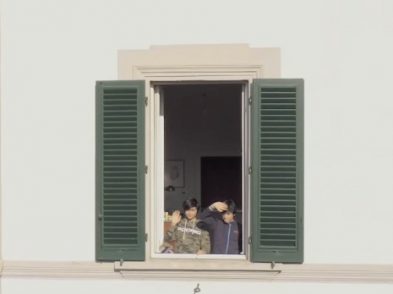In TF 177, our Valentine’s Day issue, we looked at expatriates who have stayed in Florence for love. But what happens years down the line, once the honeymoon period has passed, and you have to come to terms with many cross-cultural differences? Relationships can be a challenge at the best of times and living abroad with a partner from a different culture can make things all the more challenging. This is especially true in a country like Italy, where cultural identity is so strong. Kirsten Hills, examines some of the common tensions arising from international relationships, the ‘flash-points,’ and, most importantly, the best way to navigate them.
Speak to any foreigner who has settled here for love, and pretty soon you’ll be comparing notes on the quirky and contrasting ways Italians do things. Whether it is the custom of ironing underwear, using a bidet, complaining about ‘the dreaded’ colpo d’aria, walking around the house barefoot, or keeping the TV on at dinner-time, there are some fundamental rules about what is acceptable and what is not. Once children arrive, these ‘rules’ become all the more important: no going out if it’s too cold and no wet hair; but a big yes to the children’s Catholic baptism, communion and confirmation; yes to late nights; and yes to generous helpings of sugar and salt.
I am one of the many foreigners living here, married to an Italian. We have huge differences in our approaches to raising our children, and while I initially attributed these to our individual personalities, as I have talked to other couples, I’ve come to realise that a great deal of it reflects our different cultures. While, the ‘who does what’ in the family will vary, there are some common factors that unite couples in which one person is Italian.
Whatever the difference in attitudes, whether toward discipline, parental roles, respect for elders or other issues, it is essential to understand them. Doing so will make it easier for both parties to negotiate and eventually find compromises.
Family psychotherapist Rodolfo de Bernart established the Institute of Family Therapy (www.itff.org) in Florence more than 30 years ago. ‘We need to be careful not to generalise too much about culture. An Italian from Sicily will have little in common with a partner from the Sudtirol, for example, but culture can cause problems,’ he explains. He offers an example: ‘In Italy, men are, in many ways, still traditional, and this can be difficult for American or British women to accept. Likewise the strong family ties. Some people cannot understand why it is necessary to go every Sunday to lunch at the in-laws.’
De Bernart explains another aspect of cultural difference: ‘I have seen cases where foreign people who maybe don’t like their own culture, move to Italy, but then they believe it’s important to maintain their culture, especially when they have children. Then it can become more difficult to negotiate.’ To deal with the inevitable cultural difference, de Bernart advises discussion, listening, negotiation, compromise, seeking help from friends and family, and from other expats.
De Bernart regularly sees couples with more serious problems and making a radical life change together can be a solution. Like, for example, an Australian woman and her Italian partner who eventually moved to Australia because ‘they were arguing badly in Florence, but moving back to Australia helped. It’s a radical answer, but can work.’
When a relationship breaks down, the reality of living abroad takes on a whole new significance. De Bernart explains that, in his experience, one of the highest percentages of foreigners leaving the country with their children is American women, leaving their Italian husbands. This is, of course, an extreme example of what happens when it goes wrong, and there are plenty of steps to take to avoid such extreme situations, including seeking professional help.
However, examining solely the problems of cultural differences overlooks the excitement and joy of a rich mix of values, beliefs and ways of doing things. On many occasions, I have turned to my good friends for advice. The best yet? A dear friend who is an anthropologist once said that having a family is like creating your own subculture. You take the best of both upbringings and make your own. And she is right. This means we eat the best food, encourage openmindedness and debate, and respect rules with the care-free enjoyment of the simplicity of everyday life … All with our family at the heart of everything.

THE TOP TEN
In speaking with 30 expats in relationships with Italians, I identified the 10 most frequent differences that can cause ‘clashes’ within the couple:
1. Language: ‘My husband has to do all the paperwork, bills and make the phone calls. The problem is, I still don’t feel my Italian is good enough and it’s annoying having to rely on him for certain things. My independence is really important to me.’
2. Gender roles: ‘I feel I do everything in our house! The gender roles are much more distinct here (and closer to 1950 stereotypes in the States).’
‘When I was on paid maternity leave my partner told me nights were my responsibility as it was my “job” and I was being paid for it!’
‘My mother and sister-in-law can’t understand why I refuse to iron my husband’s shirts.’
‘Why, during family meals, do the men not help but always sit and do nothing?’
3. Isolation: ‘My partner has his entire support network here (family, friends from birth, etc.) whereas I don’t, which can create an imbalance in our relationship.’
4. Respect for rules, especially with kids: ‘I will have a star chart, the naughty corner, hold back sweets by way of encouraging or discouraging bad behaviour in my kids. My partner doesn’t enforce any of it.’
5. Turning a blind eye: ‘I was astounded when I first moved to Italy to hear my 2-year-old niece call a woman a ‘stronza,’ being cute, and had everyone in stitches. But I was in shock! I would never have used a swear word at that age, nor would my family have found it entertaining!’
6. Different habits: ‘There is a real thing about turning off the lights … my husband has been known to turn them off even when I’m in the room, on my computer … is it an effort to save electricity?!’
7. Punctuality: ‘Lunch must be at one o’ clock; no earlier, no later.’
‘My wife always leaves things until the last minute, which conflicts with my organisation. I’m always the one booking and arranging holidays.’
‘Americans see things more in black and white; Italians rarely do, and when deciding things, it can be hard as I feel we never arrive at a clear resolution.’
8. Arguing style: ‘Even the way we argue is completely different. I rarely raise my voice, but my partner does much more easily. Yet to be heard, I often feel you need to shout—even with the doctor, the teachers, the bus driver—in Italy, in general.’
9. Resistant to change: ‘I find that Italians don’t like to change. They prefer to do things, even if they are more difficult, as they always have done. My husband always hand washes dishes instead of using the dishwasher and hangs things [out] to dry despite the fact that we have a dryer! These are two small examples but they signify many things!’
10. Doctor, doctor: ‘They seem to trust explicitly doctors and never question what the doctor tells you. My son was oddly teething at 3 months when the paediatrician said that was not possible that he was getting teeth, and all the while he had four of them!’







